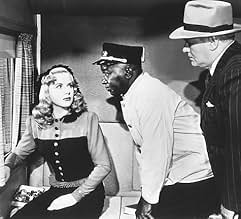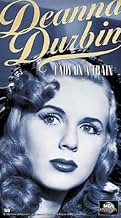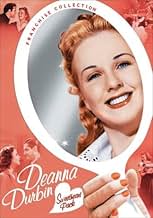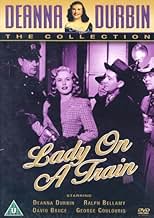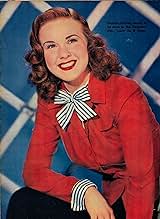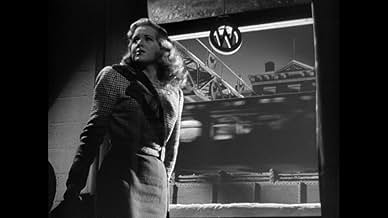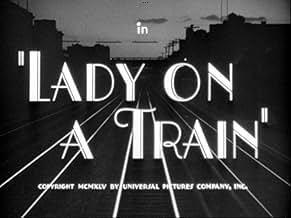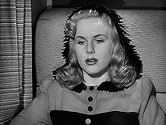IMDb RATING
6.7/10
2.8K
YOUR RATING
In New York, a woman who partially witnesses a killing from a train window seeks the aid of a crime novelist to solve the murder.In New York, a woman who partially witnesses a killing from a train window seeks the aid of a crime novelist to solve the murder.In New York, a woman who partially witnesses a killing from a train window seeks the aid of a crime novelist to solve the murder.
- Director
- Writers
- Stars
- Nominated for 1 Oscar
- 1 nomination total
Jacqueline deWit
- Miss Fletcher
- (as Jacqueline de Wit)
Jane Adams
- Circus Club Photographer
- (uncredited)
Fred Aldrich
- Cop in Lock-up
- (uncredited)
Ernest Anderson
- Train Porter
- (uncredited)
Carl Andre
- Man at Newsreel Theatre
- (uncredited)
Bobby Barber
- Man at Newsreel Theatre
- (uncredited)
- Director
- Writers
- All cast & crew
- Production, box office & more at IMDbPro
6.72.7K
1
2
3
4
5
6
7
8
9
10
Featured reviews
Wonderful Deanna Durbin
The 1930s and 40s had some lovely actresses. But few of them could compare to the dazzling Deanna Durbin. With her sparkling eyes, her wholesome smile, her beautifully blonde hair, and her charming personality, Durbin outshines everyone else in this film by far, and lifts a drab story to the level of enjoyment. She plays Nikki Collins, a smart young woman, the "Lady", in Charles David's "Lady On A Train", who, from her train compartment, witnesses an unlikely murder in a nearby building.
Technically, the film is a whodunit. But, from the beginning, viewers understand that the story is a spoof, not to be taken seriously. Playing amateur detective, Nikki races around amid various characters and comic situations, attempting to find the killer. But she's just too lucky and too clever for the plot to be considered credible.
The setting is New York City on Christmas Eve, with snow falling. As a result, the film has a soft, soothing feel to it, despite the criminal component. The film's humor is what I would describe as old-style. For example, one sequence has Nikki trying to get the attention of a mystery writer, while the writer and his girlfriend sit in a crowded theater. Nikki moves in and out of rows, disrupting the audience, with predictable humorous consequences.
In the film, Durbin sings a couple of songs, and thereby interrupts the film's flow. But, in one case, the interruption is justified, as it becomes, for me, the highlight of the entire film. Into a telephone, she sings two full verses of "Silent Night". With her magically radiant face and her beautiful singing voice, she exalts the already beautiful Christmas carol to resplendent melodic purity. This sequence is almost hypnotic in its simple beauty, and alone redeems the film from its many flaws.
Usually, I don't care for films that exist seemingly just to advance the career of the film's star. However, "Lady On A Train" is an exception. The story is not very interesting, the gags are tiresome, and the acting is average. But, through sheer force of her charming personality, Deanna Durbin alone makes this film worth watching.
Technically, the film is a whodunit. But, from the beginning, viewers understand that the story is a spoof, not to be taken seriously. Playing amateur detective, Nikki races around amid various characters and comic situations, attempting to find the killer. But she's just too lucky and too clever for the plot to be considered credible.
The setting is New York City on Christmas Eve, with snow falling. As a result, the film has a soft, soothing feel to it, despite the criminal component. The film's humor is what I would describe as old-style. For example, one sequence has Nikki trying to get the attention of a mystery writer, while the writer and his girlfriend sit in a crowded theater. Nikki moves in and out of rows, disrupting the audience, with predictable humorous consequences.
In the film, Durbin sings a couple of songs, and thereby interrupts the film's flow. But, in one case, the interruption is justified, as it becomes, for me, the highlight of the entire film. Into a telephone, she sings two full verses of "Silent Night". With her magically radiant face and her beautiful singing voice, she exalts the already beautiful Christmas carol to resplendent melodic purity. This sequence is almost hypnotic in its simple beauty, and alone redeems the film from its many flaws.
Usually, I don't care for films that exist seemingly just to advance the career of the film's star. However, "Lady On A Train" is an exception. The story is not very interesting, the gags are tiresome, and the acting is average. But, through sheer force of her charming personality, Deanna Durbin alone makes this film worth watching.
"Winnipeg's Sweetheart"
Deanna Durbin was truly a Hollywood phenomenon. Never comfortable as a film star, she exuded just enough conflicting emotion to make her screen persona fascinating.
In film after film, regardless of the part or situation, Durbin was never entirely at home before the camera or in her roles. True, she put up a great front, and by her mid teens was the highest paid female in the world.
Audiences loved her, supported her films, bought Durbin dolls, and reveled in her fan clubs. But Durbin herself apparently couldn't have cared less.
"Lady on a Train" is a case in point: her fifth to final film made at age 24 just 3 years before she retired at age 27, is a quirky hybrid of murder mystery, musical, and comedy. It gives Deanna a chance to flex her adult acting chops, while offering ample opportunities to warble vocal selections.
Durbin's dichotomy of between being on camera while wishing she were somewhere else is what provides her personality intrigue. Despite her infectious smile and gorgeous natural voice, Durbin's persona was negative.
What saved her was that she was a very good actress, and in fact became the saving grace of Universal Studios. Finally finding salvation in marriage to her "Lady on a Train" director, she kissed everything goodbye and left filmdom at the peak of her powers.
I'm sure she found what she was looking for in that quaint Parisian suburb, and that she may have significantly extended her longevity in the process. In the meantime, she left her public with some very pleasant films to enjoy.
In film after film, regardless of the part or situation, Durbin was never entirely at home before the camera or in her roles. True, she put up a great front, and by her mid teens was the highest paid female in the world.
Audiences loved her, supported her films, bought Durbin dolls, and reveled in her fan clubs. But Durbin herself apparently couldn't have cared less.
"Lady on a Train" is a case in point: her fifth to final film made at age 24 just 3 years before she retired at age 27, is a quirky hybrid of murder mystery, musical, and comedy. It gives Deanna a chance to flex her adult acting chops, while offering ample opportunities to warble vocal selections.
Durbin's dichotomy of between being on camera while wishing she were somewhere else is what provides her personality intrigue. Despite her infectious smile and gorgeous natural voice, Durbin's persona was negative.
What saved her was that she was a very good actress, and in fact became the saving grace of Universal Studios. Finally finding salvation in marriage to her "Lady on a Train" director, she kissed everything goodbye and left filmdom at the peak of her powers.
I'm sure she found what she was looking for in that quaint Parisian suburb, and that she may have significantly extended her longevity in the process. In the meantime, she left her public with some very pleasant films to enjoy.
Genre blender of considerable worth.
Lady on a Train is directed by Charles David and adapted to screenplay by Edmund Beloin and Robert O'Brien from a Leslie Charteris story. It stars Deanna Durbin, Ralph Bellamy, David Bruce, George Coulouris, Allen Jenkins, Dan Duryea and Edward Everett Horton. Music is by Miklos Rozsa and cinematography by Woody Bredell.
Part murder mystery, part film noir, part comedy and part musical! And it's a Christmas movie as well! Lady on a Train has a lot going on for sure. It's a fun packed little movie that gives Durbin full licence to show her various talents before she retired out of the limelight three years later. In main essence it's the murder mystery aspect that drives the picture forward. Durbin plays Nikki Collins, a spunky young woman who loves reading detective mysteries, so when she witnesses a murder being committed from her train window seat, she's obviously all of a tingle. However, convincing the authorities of what she saw proves to be difficult and she decides to take up the case herself. Pretty soon she is up to her neck in intrigue and life threatening peril.
Things start getting twisty once Durbin meets the victim's bizarre family, a veritable roll call of miserablists and shifty shysters. Aided by mystery writer Wayne Morgan (Bruce), Nikki has to run the gamut of bluffing and boldness to stay one step ahead of the game, including imitating a chanteuse singer. This allows Durbin to the chance to warble three songs, with a version of "Silent Night" beautifully tender and a sensuous and sultry rendition of "Gimme a Little Kiss, Will Yah, Huh?" Having us in the palm of her hand. It builds nicely to a darkly tinged last third, where Bredell's noirish photography comes into its own and the resolution of the tale is most satisfactory. Good laughs, good suspense and good songs, well worth a viewing. Story was filmed as a straight British thriller in 1940 titled A Window in London, with Michael Redgrave starring. 7/10
Part murder mystery, part film noir, part comedy and part musical! And it's a Christmas movie as well! Lady on a Train has a lot going on for sure. It's a fun packed little movie that gives Durbin full licence to show her various talents before she retired out of the limelight three years later. In main essence it's the murder mystery aspect that drives the picture forward. Durbin plays Nikki Collins, a spunky young woman who loves reading detective mysteries, so when she witnesses a murder being committed from her train window seat, she's obviously all of a tingle. However, convincing the authorities of what she saw proves to be difficult and she decides to take up the case herself. Pretty soon she is up to her neck in intrigue and life threatening peril.
Things start getting twisty once Durbin meets the victim's bizarre family, a veritable roll call of miserablists and shifty shysters. Aided by mystery writer Wayne Morgan (Bruce), Nikki has to run the gamut of bluffing and boldness to stay one step ahead of the game, including imitating a chanteuse singer. This allows Durbin to the chance to warble three songs, with a version of "Silent Night" beautifully tender and a sensuous and sultry rendition of "Gimme a Little Kiss, Will Yah, Huh?" Having us in the palm of her hand. It builds nicely to a darkly tinged last third, where Bredell's noirish photography comes into its own and the resolution of the tale is most satisfactory. Good laughs, good suspense and good songs, well worth a viewing. Story was filmed as a straight British thriller in 1940 titled A Window in London, with Michael Redgrave starring. 7/10
Screwball Noir
This marks the first film I've seen by Ms. Durbin from beginning to end and I must say I found it to be a lot of fun. This film is without a doubt a star vehicle for Ms. Durbin; I think I counted 7 costume changes, at least 5 different blond hairstyles over the course of the picture and it was well directed by her husband Charles David. There was also the (I think) required scene where she got to speak to someone on a white telephone. The plot of the picture is that Ms. Durbin sees a murder from her train window and enlists the aid of a mystery writer to solve the crime. I am a fan of film noir and this film is sort of a combination film noir (good mystery plot, chases in dark alleys), musical (Durbin singing "Silent Night" and "Night and Day" among others)and comedy (many slapstick scenes involving Ms. Durbin as an amateur detective). You might even call this picture screwball noir. Ms. Durbin was probably the most popular star under contract to Universal until Abbott and Costello arrived and this film marked one of the few change of pace roles she was given and she literally shines in the part. The only negative comment I have is that there are a few dated racial stereotypes that I wish had been eliminated. Other than that, I found it to be stylish entertainment.
The plot is Agatha Christie material...Durbin has fun in a comic thriller...
Deanna Durbin finally got a chance to get out of her giddy teen-age roles and into a giddy adult role for a nice change of pace! She's made up to look sophisticated as she emotes in a screwball comedy-mystery about a girl who witnesses a murder from her train window and then sets out to find the corpse and the killer with the help of a mystery writer (David Bruce). The cast is studded with oddballs: Edward Everett Horton, Dan Duryea, Elizabeth Patterson, George Coulouris, Jacqueline DeWitt, Ralph Bellamy, William Frawley. All of it is highly unlikely but reality is not what this amusing mystery spoof is about. Deanna Durbin not only manages to bring comic flair and poise to her inquisitive young lady--she does a nifty job on some torchy night-club numbers: Night and Day and Give Me A Little Kiss, as well as Silent Night for a Christmas scene. Enjoyable as long as you're not expecting true-to-life situations! The wacky plot seems like something Agatha Christie might have spun in one of her wilder moments.
Did you know
- TriviaDeanna Durbin and director Charles David were wed in 1950 and retired to a life in rural France. They remained married until his death in 1999.
- GoofsWhen Mr. Haskell leaves Grand Central Station with Nikki Collins, they call for a taxi. When a taxi pulls up, however, Nikki's luggage is already piled in the front seat though she did not walk out with any bags nor did a porter load any luggage into the taxi. The taxi wasn't there waiting for them; it was just a random taxi that happened to pull up. The sequence, therefore, doesn't make any sense, and it interrupts the flow of the story.
- Quotes
Nikki Collins: I just saw a murder.
- ConnectionsEdited into Christmas Hymns (1954)
- SoundtracksSilent Night
Original lyrics by Joseph Mohr (uncredited)
Melody by Franz Xaver Gruber (uncredited)
English translation by John Freeman Young (uncredited)
Details
Box office
- Gross worldwide
- $34
- Runtime
- 1h 34m(94 min)
- Color
- Aspect ratio
- 1.37 : 1
Contribute to this page
Suggest an edit or add missing content


